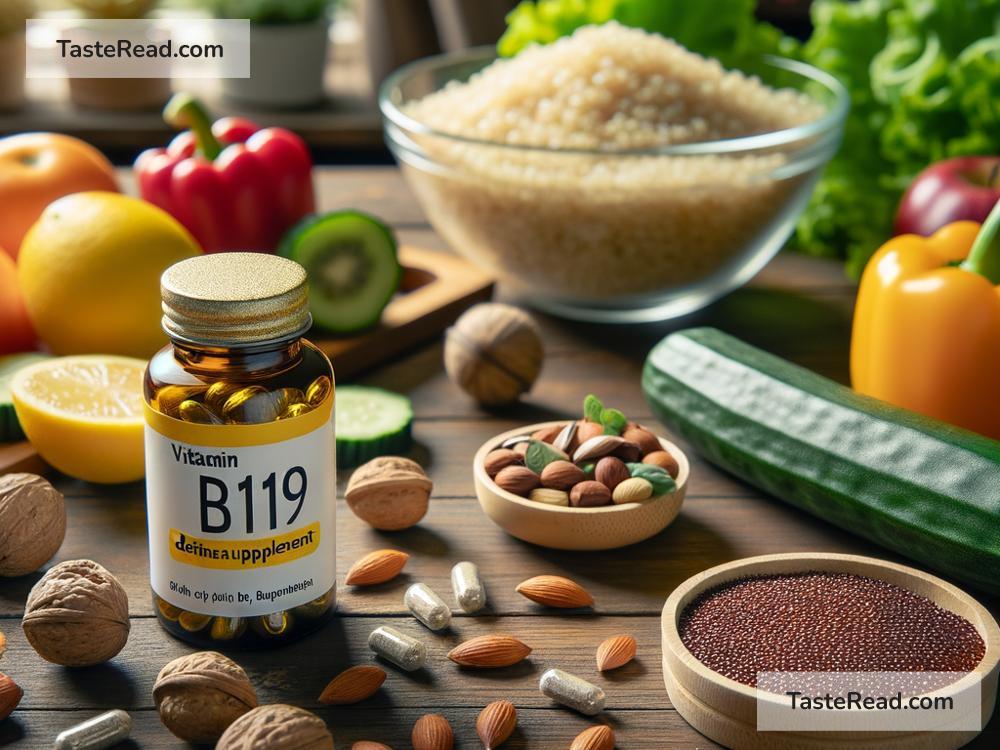The Role of Vitamin B119 in Metabolic Health
Vitamins play a key role in keeping our bodies healthy and working properly. Among the many vitamins, the B vitamins are especially important because they help the body turn food into energy, improve brain function, and support overall wellness. You’ve probably heard of Vitamin B1 (thiamine), Vitamin B6, or Vitamin B12, but what about Vitamin B119? While it isn’t as well-known, Vitamin B119 is gaining attention for its role in metabolic health.
What Is Vitamin B119?
Vitamin B119 is a relatively new discovery in the field of vitamins and nutrition. Scientists have identified this compound as part of the B vitamin family because of its involvement in important processes in the body. It is also referred to as “orthobiotin,” and it works alongside other B vitamins to promote health.
Like other B vitamins, Vitamin B119 is water-soluble, meaning your body doesn’t store it for long periods. Instead, whatever your body doesn’t use gets flushed out when you urinate. That’s why it’s important to get enough Vitamin B119 regularly through food or supplements to maintain optimal health.
Why Is Metabolic Health Important?
Before we dive into Vitamin B119’s specific role, let’s talk about metabolic health. Metabolism is the process where your body converts the food and drinks you consume into energy. This energy is then used to power everything your body does, from breathing to thinking to exercising.
Good metabolic health means that your body is efficiently using and storing energy, keeping blood sugar, cholesterol, and other chemical levels in balance. Poor metabolic health, on the other hand, can lead to problems like obesity, diabetes, high blood pressure, and heart disease. That’s why it’s important to support your metabolism with the right nutrients—Vitamin B119 being one of them.
How Does Vitamin B119 Help Metabolic Health?
Vitamin B119 plays a key role in the enzymes that help your body break down carbohydrates, fats, and proteins. Enzymes are like little machines in your body that make chemical reactions happen. Without enzymes, your body wouldn’t be able to take the food you eat and turn it into usable energy.
Vitamin B119 helps these enzymes function effectively, boosting your metabolism and supporting energy production. When your metabolism is working well, you’re less likely to experience symptoms of poor metabolic health, such as fatigue, weight gain, or blood sugar imbalances.
Here are a few ways Vitamin B119 helps your body:
-
Supports Energy Production: One of Vitamin B119’s main jobs is helping the body turn carbohydrates—like bread, rice, and potatoes—into energy. Without enough Vitamin B119, you might feel tired or sluggish.
-
Helps Process Fats: Besides carbohydrates, Vitamin B119 also supports the breakdown of fats, which your body uses as an energy reserve. It ensures fats are metabolized efficiently, preventing fat buildup in the liver and other areas.
-
Regulates Blood Sugar: Stable blood sugar levels are crucial for metabolic health. Vitamin B119 supports enzymes that manage glucose regulation, helping your body avoid spikes and crashes in blood sugar.
-
Promotes Cellular Health: Every bit of your body is made up of cells, and Vitamin B119 helps keep those cells healthy by supporting their energy needs and repair processes.
Sources of Vitamin B119
Since Vitamin B119 is water-soluble and not stored in the body, you need to consume it regularly. But here’s the tricky part: Vitamin B119 isn’t found in many common foods. Research is still ongoing, but the following foods may contain trace amounts of Vitamin B119:
- Eggs
- Meat (especially organ meats like liver)
- Whole grains
- Some green vegetables (like spinach and broccoli)
Because it’s not as abundant in food sources as other vitamins, Vitamin B119 might be difficult to get through diet alone. Luckily, there are supplements available to help you meet your needs.
Should You Take Vitamin B119 Supplements?
If you’re concerned about your metabolic health or think you might be deficient in Vitamin B119, talk to a doctor or nutritionist before taking supplements. While Vitamin B119 is generally considered safe, it’s always best to get professional guidance on what your body needs and how much you should take.
Some people who might benefit from Vitamin B119 supplementation include:
– Those with chronic fatigue or low energy levels
– Individuals managing diabetes or blood sugar issues
– Athletes needing extra metabolic support
– People on restrictive diets that lack variety in food sources
Conclusion
Vitamin B119 may not be the most famous member of the B vitamin family, but its role in metabolic health is nothing to overlook. From supporting energy production to regulating blood sugar, Vitamin B119 keeps your body running smoothly. As research continues, we are learning more about how this vitamin can help us maintain good metabolic health.
Remember, eating a balanced diet is key to overall wellness. While Vitamin B119 supplements can be helpful, don’t forget the importance of nutritious foods like eggs, whole grains, and green veggies. By prioritizing metabolic health and staying informed about new nutritional discoveries, you’re giving your body the tools it needs to thrive.
If you haven’t thought much about Vitamin B119 before, now’s the time to start! Your metabolism—and overall health—will thank you.


